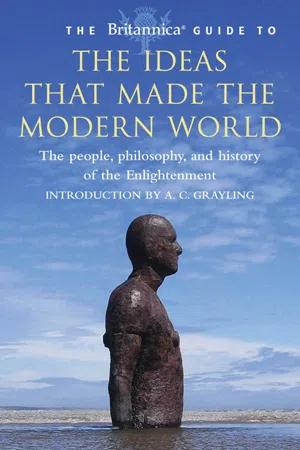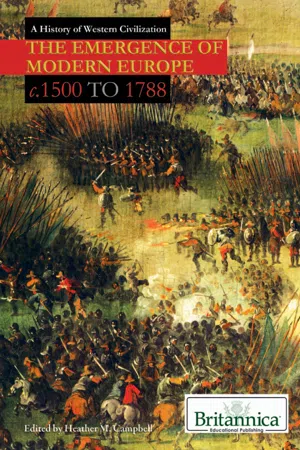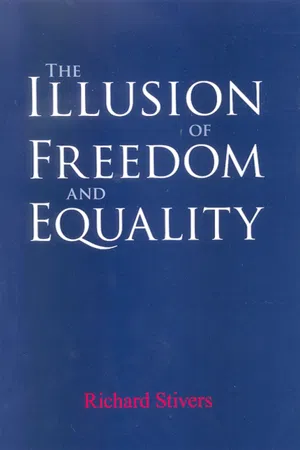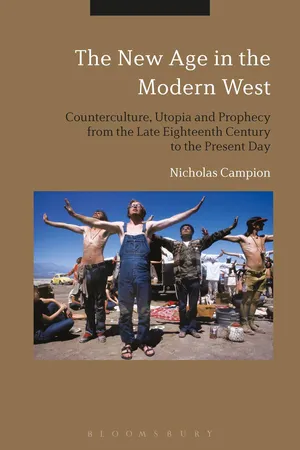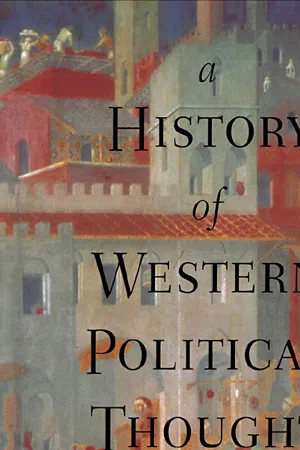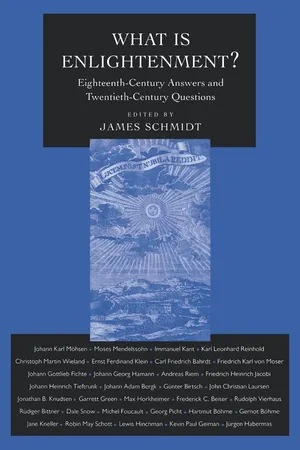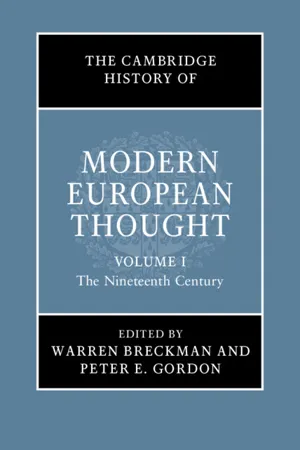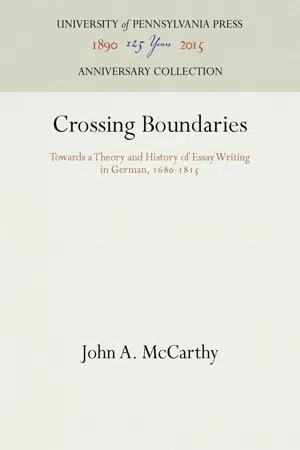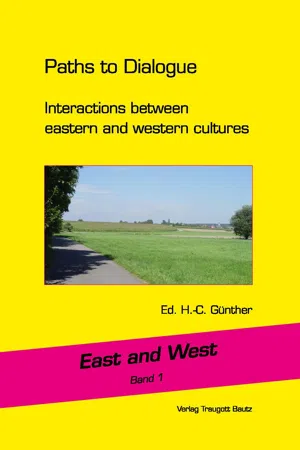History
Enlightenment Thinkers
Enlightenment Thinkers were a group of influential philosophers and intellectuals in the 18th century who advocated for reason, individualism, and the rights of the individual. They sought to challenge traditional authority and promote ideas of freedom, democracy, and progress. Key figures of this movement include Voltaire, John Locke, Jean-Jacques Rousseau, and Immanuel Kant.
Written by Perlego with AI-assistance
Related key terms
1 of 5
10 Key excerpts on "Enlightenment Thinkers"
- eBook - PDF
- Encyclopaedia Britannica, Inc.(Authors)
- 2008(Publication Date)
- Encyclopaedia Britannica, Inc.(Publisher)
1 A HISTORY OF THE ENLIGHTENMENT The Enlightenment (in French the Sie Ácle des Lumie Áres ( ``Age of the Enlightened''), in German Aufkla È rung ) swept through Europe in the 17th and 18th centuries. With new ideas con-cerning God, reason, nature, and man, the Enlightenment offered a world view that gained wide assent and instigated revolutionary developments in art, philosophy, and politics. Central to Enlightenment thought were the use and the cele-bration of reason, the power by which man understands the universe and improves his own condition. The goals of ra-tional man were considered to be knowledge, freedom, and happiness. The Enlightenment was both a movement and a state of mind. The term represents a phase in the intellectual history of Europe, but it also serves to define the programmes of reform advocated by influential French writers, philosophers, and scientists, known as ``philosophes'', who were inspired by a common faith in the possibility of a better world. The special significance of the Enlightenment lies in its combination of principle and pragmatism. There are two traditional schools of thought regarding its character and achievements. The first sees the Enlightenment as the preserve of an elite centred on Paris and as primarily a French movement, while the second perceives it as an inter-national phenomenon with as many facets as there were countries affected. Although most modern interpreters incline to the latter view, there is still a case for the French emphasis, given the genius of a number of the philosophes and their associates. Unlike other terms applied by historians ``the Enlightenment'' was used and cherished by those who believed in the power of the mind to liberate and improve. - eBook - ePub
The Emergence of Modern Europe
c. 1500 to 1788
- Britannica Educational Publishing, Heather Campbell(Authors)
- 2010(Publication Date)
- Britannica Educational Publishing(Publisher)
CHAPTER 6 T HE E NLIGHTENMENT T he Enlightenment was both a movement and a state of mind. The term represents a phase in the intellectual history of Europe, but it also serves to define programs of reform in which influential literati, inspired by a common faith in the possibility of a better world, outlined specific targets for criticism and proposals for action. The special significance of the Enlightenment lies in its combination of principle and pragmatism. Consequently, it still engenders controversy about its character and achievements. Two main questions and, relating to each, two schools of thought can be identified. Was the Enlightenment the preserve of an elite, centred on Paris, or a broad current of opinion that the French intellectuals known as the philosophes, to some extent, represented and led? Was it primarily a French movement, having therefore a degree of coherence, or an international phenomenon, having as many facets as there were countries affected? Although most modern interpreters incline to the latter view in both cases, there is still a case for the French emphasis, given the genius of a number of the philosophes and their associates. Unlike other terms applied by historians to describe a phenomenon that they see more clearly than could contemporaries, it was used and cherished by those who believed in the power of mind to liberate and improve - eBook - PDF
- Richard Stivers(Author)
- 2008(Publication Date)
- SUNY Press(Publisher)
The rising middle classes per- ceived that the extant political and economic order was unjust. 12 En- lightenment ideology was first and foremost middle-class ideology. It would be hard to do justice to the wealth of treatises and essays during this period. For my purposes I want to contrast British and French thought in the Enlightenment in the persons of John Locke and Jean-Jacques Rousseau. The former represents a type of liberal- ism that greatly influenced the American Revolution and the found- ing of America; the latter, a kind of humanism that informed the French Revolution and with the concept of a “social contract” aided 14 The Illusion of Freedom and Equality the American Revolution as well. In these two writers (with occa- sional brief discussions of related authors such as Adam Smith and Benjamin Constant), we can discover the tension in Enlightenment thought between individualism and holism. Are freedom and equality to be defined exclusively in terms of the individual, or are they to be articulated in an interpersonal or societal context? JOHN LOCKE AND LIBERALISM John Locke wrote that individuals are according to their nature free and equal. Humans possess natural rights, and these rights are equal for all members of the species. These rights include: (1) the right to life; (2) the right to freedom from the arbitrary control of one’s actions and possessions; (3) and the right to property. 13 This final right, as we will see later, introduces inconsistencies if not con- tradictions into his theory. Above all, the liberalism of the late seventeenth century through the mid-nineteenth century, was a champion of the individual. Al- though theorists continued to discuss nature, nature’s laws, and human nature, they examined them from a scientific rather than a religious perspective. Locke’s psychology was a combination of ra- tional hedonism and “sensationalism.” Human beings, in this view, are rational in the pursuit of pleasure and the avoidance of pain. - eBook - PDF
The New Age in the Modern West
Counterculture, Utopia and Prophecy from the Late Eighteenth Century to the Present Day
- Nicholas Campion(Author)
- 2015(Publication Date)
- Bloomsbury Academic(Publisher)
Under such pressures, the need to save the standard model of the rational Enlightenment has thrown up several solutions. One is the move away from a single, all-encompassing Enlightenment, and instead the identification of multiple Enlightenments and a series of Counter-Enlightenments, which constituted successive challenges to the Enlightenment. 61 We may therefore have a ‘Radical Enlightenment’, which is the ancestor of modern liberalism, leaving the French terror as a ‘Rousseaueste’ aberration. 62 Then there is a ‘Low Counter-Enlightenment’ of popular polemics, attacking the philosophes , for their anti-religious tendencies. 63 Enlightenment and Progress in the Eighteenth Century 47 The abandonment of a singular ‘Enlightenment’ in favour of plural ‘Enlightenments’ parallels the recognition of multiple ‘countercultures’. 64 So we are left with the following position: there was a group of philosophers, mainly in France, who believed in liberty of thought, argued that the world could be understood empirically and as a natural process, and tended to be anti-monarchical and anti-ecclesiastical. They were elite counterculturalists, challenging authoritarian political systems and religious dogmas of their time. But there is no necessary connection between such principles and a range of political ideologies, beyond opposition to absolute monarchy. The philosophes ’ rejection of Christianity with its own notions of equality amongst the descendants of Adam and Eve, it is argued, opened the way to the inherently unequal notions of modern racism. For example, Voltaire, the icon of Enlightenment rationalism, regarded the African Negro as belonging to a different and inherently inferior species to the European, in fact, more like an elephant or a monkey than a Frenchman; The negro race is a species of men as different from ours as the breed of spaniels is from that of greyhounds … if their understanding is not of a different nature from ours, it is at least greatly inferior. - eBook - PDF
- J. S. McClelland, Dr J S Mcclelland(Authors)
- 2005(Publication Date)
- Routledge(Publisher)
In his famous essay What is Enlightenment? of 1784, Kant offered a celebrated definition of what it was to be enlightened: to be enlightened was to ‘dare to know’. Kant chose to regard the whole of eighteenth-century thought as a revolt against ignorance and superstition. Knowing was to know the basis of things, how things really worked. Kant’s is a very tempting definition of Enlightenment. It readily brings to mind some of the great intellectual battles of the age. Biblical criticism, for example, began to ask seriously what kind of record of the past the Old and New Testaments actually provided (the measurements of Noah’s ark described a vessel much too small to contain all the animals mentioned in Genesis). In France, there was a battle over the superstitious influence of the Jesuits, especially in education. Voltaire attempted to popularise and spread the teachings of Newtonian physics as the true constitution of the universe (and called his mistress Madame Venus-Newton). One thinks of the tremendous growth of interest in A history of western political thought 284 accounts of other, non-Christian, civilisations like Ancient Egypt, Persia and China, from which the Christian West perhaps had something to learn. Coupled with this concern with other civilisations went a genuine attempt to write ‘philosophical’ history, what we would now call comparative cultural sociology. This was a vast intellectual enterprise designed to show that all societies left to themselves were necessarily bound to go through the same processes of growth, maturity and decline. I say ‘left to themselves’ because an important part of Enlightenment consisted of devising ways in which that apparently ineluctable process of development could in fact be changed into necessary and inevitable progress, and all this without a word from God. Enlightenment also meant an enquiry into the means of knowing itself: what we call epistemology. - eBook - PDF
- James Schmidt(Author)
- 1996(Publication Date)
- University of California Press(Publisher)
Introduction What Is Enlightenment? A Question, Its Context, and Some Consequences James Schmidt The Enlightenment has been blamed for many things. It has been held re-sponsible for the French Revolution, for totalitarianism, and for the view that nature is simply an object to be dominated, manipulated, and ex-ploited. It has also been implicated in one way or another in European imperialism and the most aggressive aspects of capitalism. While some have insisted that its skepticism about absolute values infects our culture with a nihilistic sluggishness, others have suggested that liberal societies should divest themselves of the Enlightenment's obsession with philosophical foun-dations. I It is said that its passion for rights and liberties unleashed a de-structive individualism that undermines any sense of community.2 Yet it has also been argued that its assumption that human nature was infinitely malleable has provided the intellectual inspiration for attempts by total-itarian states to eradIcate all traces of individuality from their subjects. 3 It has been criticized for its insensitivity to the tragic character of moral con-flicts and for its naive assumption that all dilemmas have simple solutions. 4 It has been argued that its attempt to construct a moral philosophy ended in failure, leaving us with either an impoverished moral vision that sup-presses all values that cannot be reduced to instrumental efficiency or a corrupted moral discourse in which ethical evaluations are nothing more than a mask for individual preferences. s It has been castigated for its affec-tion for master metanarratives and its hostility toward otherness.6 Its racism and its sexism have not passed unnoticed. 7 Looking over this list of charges, one wonders how one period could have been responsible for so much and so many different kinds of harm. - Warren Breckman, Peter E. Gordon(Authors)
- 2019(Publication Date)
- Cambridge University Press(Publisher)
(New York: W. W. Norton & Co., 1966–1969). For excellent examples of newer approaches, see Roy Porter and Mikuláš Teich (eds.), The Enlightenment in National Context (Cambridge: Cambridge University Press, 1981); Ulrich Im Hof, The Enlightenment, trans. W. E. Yuill (Oxford: Blackwell, 1994); Roger Chartier, The Cultural Origins of the French Revolution, trans. Lydia Cochrane (Durham: Duke University Press, 1993); Margaret Jacob, The Radical Enlightenment: Pantheists, Freemasons, and Republicans (London: Allen & Unwin, 1981); Roy Porter, The Enlightenment, 2nd edn. (New York: Palgrave, 2001); and Jonathan Israel, Radical Enlightenment: Philosophy and the Making of Modernity, 1650–1750 (Oxford: Oxford University Press, 2001). 3 Immanuel Kant, “Answer to the Question: What Is Enlightenment,” in Basic Writings of Kant, ed. Allen W. Wood, trans. Thomas K. Abbott (New York: Modern Library, 2001), 135. warren breckman and peter e. gordon 4 The greatest undertaking of the French Enlightenment, the Encyclopedia launched by Denis Diderot and Jean le Rond d’Alembert in 1751 and concluded in 1772, eventually included almost 72,000 articles restructuring the world of knowledge and human endeavor according to the ambitions of the siècle des lumières: from entries on revelation, clergy, atheists, natural law, natural equality, invention, hydrodynamics, cosmology, and reason, to theocracy, torture, the slave trade, and intolerance, to farm laborers, cotton, mining, metallurgy, commerce, and inoculation, the world was to be reformed in the light of rational, systematic, and empirically grounded knowledge. 4 The reformist and ameliorist impulses of the Enlightenment continued to course through the nineteenth century. That is also true of the Enlightenment’s most provocative claims for the power of human reason to discover truth and propel progressive change.- eBook - PDF
Crossing Boundaries
Towards a Theory and History of Essay Writing in German, 168-1815
- John A. McCarthy(Author)
- 2016(Publication Date)
8o THE WORLD OF EIGHTEENTH-CENTURY THOUGHT Enlightenment as Active Thought Process The means by which the ultimate goal of humanity can be attained is the faculty for conscious reflection. Obviously that faculty requires cul-tivation. Thus, before we leave the topic of eighteenth-century thought, we need to hear some specifically eighteenth-century voices on the sem-inal role of critical thinking in perfecting human nature. These voices will serve as a balance to the jaundiced view presented by Horkheimer and Adorno in their Dialektik der Aufklärung. The purpose of the ensuing overview is to demonstrate that critical, independent thinking was a constant hallmark of the Aufklärung from its inception; it did not first emerge with Kant, nor did it quickly expire after Thomasius. Moreover— and this is of great significance for Crossing Boundaries—а startling number of the theorists of the art of thinking in the time frame 1680 — 1815 turned to essayistic writing to express their ideas in particularly salient fashion. First of all, it must be understood that critical thinking in our context has nothing to do with metaphysics, although it is concerned with an ultimate discourse on method. Beginning with Thomasius and Leibniz, a major thrust of the Enlightenment was moral and practical. This major emphasis is evident in the titles of works from Thomasius's Ausübung der Vernunftlehre {The Practice of Rational Doctrine, 1691) to Kant's An-thropologie in pragmatischer Hinsicht (Anthropology in a Pragmatic Light, 1798). The explanation for the continuing interest in the practical application of knowledge is clear: the focus of these true Enlighteners was consistently trained on humankind itself. The human race, as Pope had put it, is the proper study of mankind. All other kinds of knowledge are extraneous to this gravitational point. - eBook - PDF
- Hans-Christian Günther, Li Yong, Hans-Christian Günther, Li Yong(Authors)
- 2016(Publication Date)
- Verlag Traugott Bautz GmbH(Publisher)
67 Thus, it is important to see that the Enlightenment shaped itself as a reaction against a specific form of what, provisorially, can be called religion, i.e. traditional European Christianity, and such a reaction to a specific, 67 See Günther below. Günther 128 the Christian religiosity it is, whatever shade it may have taken and whatever stance – more or less friendly – it took towards religion. In its essence tThe Enlightenment amounted to a radical vindication of reason as the sole measurement of men’s attitude towards the world. As such, it only developed an antagonism inherent in this very special form of religiosity, Christianity, itself (i.e. the antagonism ratio vs. fides). The Enlightenment established the predominance of reason but in a very specific way; that is, as it was shaped by Greek philosophy and in late antiquity (Christianity), making for a very uneasy mixture. Thus, before we can understand any concept of enlightenment, we must understand this very spectific, inherently antagonistic mixture between ‘reason’ and (Christian) religion and, thereby, answer the following question: what is reason in the original sense of the word in European culture? On various occasions, I have pointed out that Greek philosophy can most generally be defined as a descriptive approach to the world. More specifically, it is an approach which treats the world as if it was a preexisting, fixed whole, a collection of things or facts that provoke the human mind to find the reason of their being or, even moreso, the reason for their beginning, the fundamental origin of their existence (all of our moderm terms such as ‘reason’, ‘cause’, ‘beginning’, etc. are, at best, very Enlightenment, China and the West 129 imperfect translations of their respective Greek terms). 68 The decision to approach the world in this way – and it is a decision, not an inevitability – is technical and, thus, inherently practical. - Allen W. Wood, Songsuk Susan Hahn(Authors)
- 2012(Publication Date)
- Cambridge University Press(Publisher)
One of these tenets was natural law, the doctrine that there are uni- versal moral standards that hold throughout history and that apply to all societies, states, and cultures.The Enlightenment made the law of nature into its standard of critique, the measure of the moral value of all societies, states, and cultures. Historicism undermined, however, the very possibility of a natural law, for if we investigate human values historically, we see that their meaning and purpose depend entirely on their specific context, their precise role in a social-historical whole. Since values depend on their context and since these contexts change and vary, human values also change and vary with them. Since, furthermore, these contexts are unique and individual, it follows that the values that are part of them should be incommensurable, so that there is no common standard to judge them. It is indeed impossible to generalize about values, as if what held true in one soci- ety and culture should hold in another.What results from any attempt to gener- alize is only the hypostasized or illegitimately universalized version of the values of one culture. Whenever the Enlightenment passed judgment on past societies or alien cultures, these would turn out to be, as soon as one scratched underneath the surface, nothing more than the standards of eighteenth-century Europe. Another characteristic value of the Aufklärung is self-thought (Selbstdenken), that is, the demand that the individual think for himself, accepting only those beliefs for which there is sufficient evidence.
Index pages curate the most relevant extracts from our library of academic textbooks. They’ve been created using an in-house natural language model (NLM), each adding context and meaning to key research topics.
